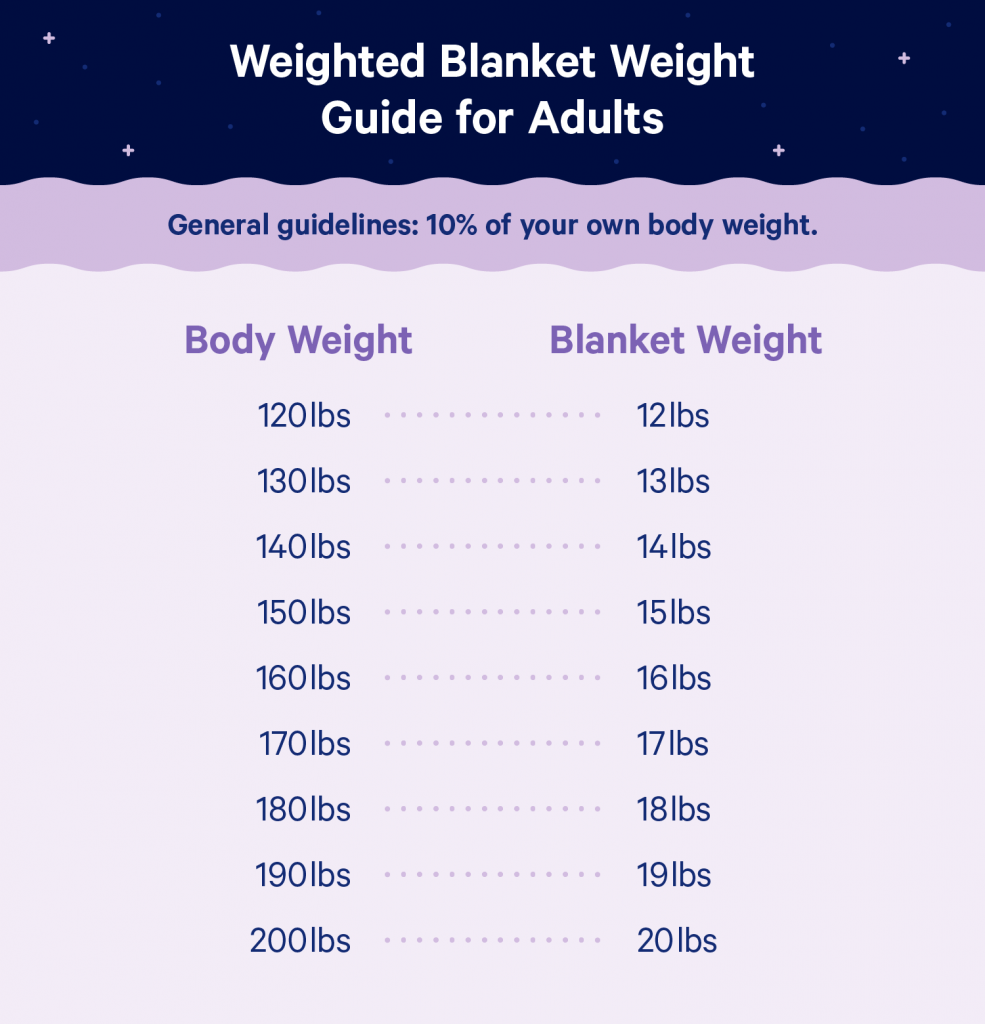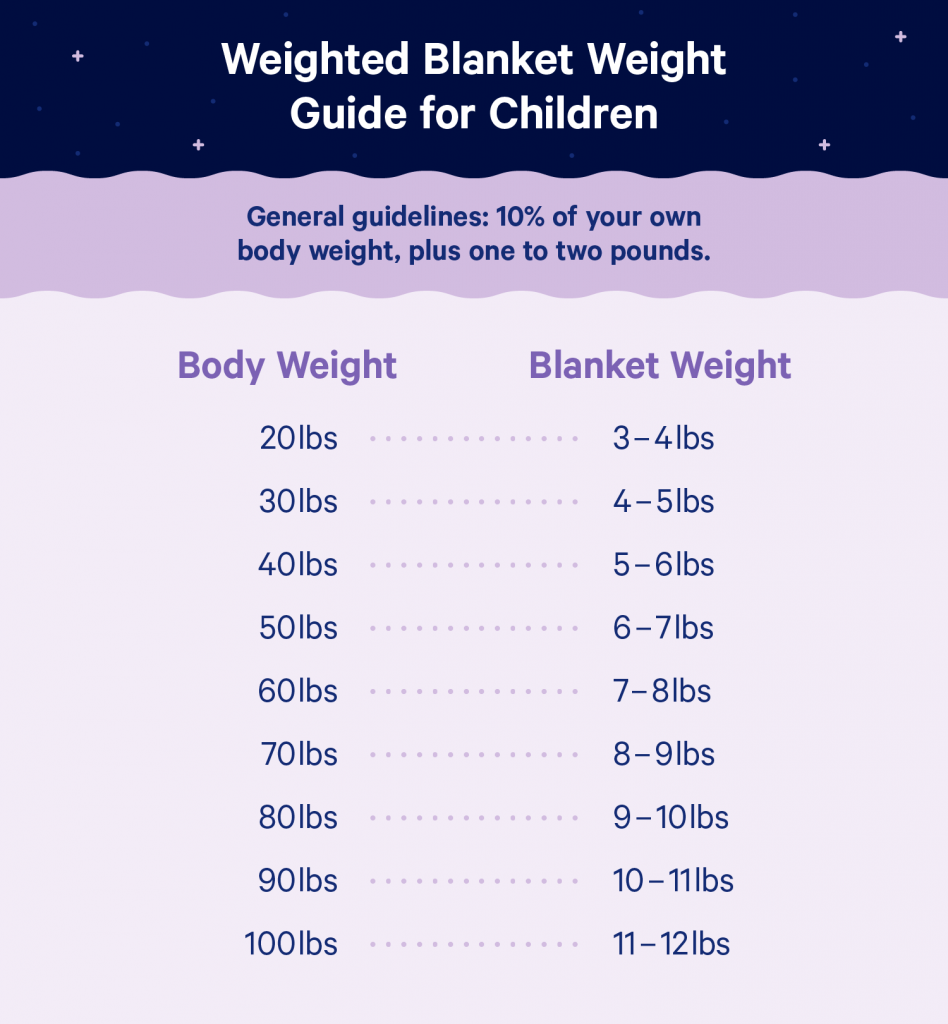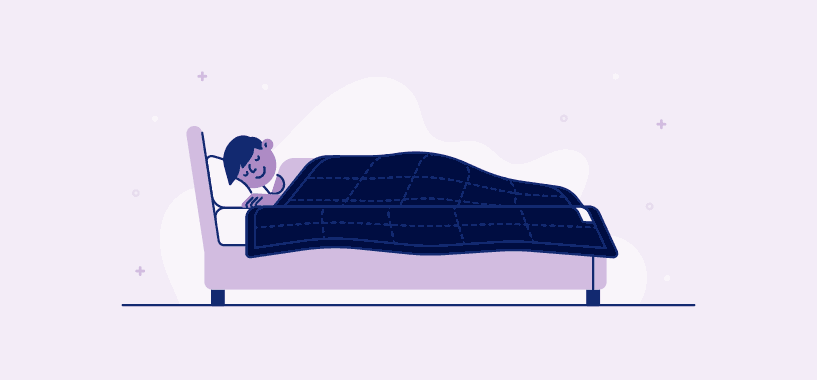At-home measures like weighted blankets can have similar effects to deep pressure therapy.
Autism, ADHD, and anxiety have all been demonstrated to benefit from the use of these blankets. Sleep problems can be alleviated with the help of these products.
A weighted blanket that’s 10% of your body weight is ideal for you to use at home.
What Is a Weighted Blanket?
Plastic pellets or glass microbeads are the most common fillers in weighted blankets. The addition of batting to these beads or pellets helps to keep them warm while also reducing the sensation and sound of the fill changing. Weighing anywhere from 5 to 30 pounds, most weighted blankets are substantially heavier than standard down comforters and duvets. To make washing easier, some weighted blankets feature a removable cover.
In theory, weighted blankets can boost dopamine and serotonin production and reduce levels of cortisol, the stress hormone, by providing a sense of security and comfort to the user. Because this induces a more relaxed state, it helps the person fall asleep easier. These health claims, on the other hand, are currently being studied.
How Heavy Should a Weighted Blanket Be?
The weight of a weighted blanket should be roughly 10% of your body weight as a general rule of thumb. The appropriate weight for a weighted blanket is, of course, a matter of personal preference. Between 5% to 12% of the sleeper’s weight is the ideal weight range. Look for a blanket that gives you a sense of security as you sleep, but also delivers a sense of comfort. It’s possible that you’ll have to experiment with a few different weights before you discover one that feels right. The use of weighted blankets may not be appropriate for those who are prone to feeling confined.

Weighted Blanket Weight Chart
Weighted blankets can weigh anything from 5% to 12% of a person’s body weight, with most people choosing a weighted blanket that is 10% of their body weight or less. It doesn’t matter how light or heavy a blanket is; it should be comfortable and movable.
| Body Weight Range | Weighted Blanket Weight Range |
|---|---|
| 25-60 lbs. | 2-6 lbs. |
| 35-84 lbs. | 3-8 lbs. |
| 50-120 lbs. | 5-12 lbs. |
| 60-144 lbs. | 6-14 lbs. |
| 75-180 lbs. | 7-18 lbs. |
| 85-194 lbs. | 8-19 lbs. |
| 100-240 lbs. | 10-24 lbs. |
| 110-264 lbs. | 11-26 lbs. |
| 125-300 lbs. | 12-30 lbs. |
| 150-360 lbs. | 15-36 lbs. |
For each body weight range, current users’ comments and preferences are taken into consideration. In order to avoid misunderstandings, sleepers should not rely on these estimations as a precise science. The blanket’s material and content may also have an impact on how cozy it is and how warm it keeps you at night.
Weighted Blanket Weights for Children
Children who weigh at least 50 pounds and are at least three years old can safely use a weighted blanket. Weighted blankets for youngsters have become increasingly popular in recent years. The weight ranges from 3 to 12 pounds for these blankets.
When selecting a child’s weighted blanket, parents should exercise caution and follow the “10% rule” to the letter. Even if you speak with your child’s doctor about the appropriate weight for a weighted blanket, you should still err on the side of caution and go for a lighter option.
Although weighted blankets have become popular among children, several medical professionals have questioned the effectiveness of these products. Weighted blankets have been shown to help youngsters with autism spectrum disorder sleep better in one research. The blankets were appreciated by the participants, but they had no effect on their ability to fall asleep or stay asleep during the night.

Weighted Blanket Safety
There are certain sleepers who benefit from weighted blankets, but there are others who may be at risk. Because a blanket that is overly heavy can block airflow and make breathing more difficult for persons with breathing issues, this is especially true.
If you have any of the following conditions, you should consult with your doctor before wearing a weighted blanket:
- Low blood pressure
- Respiratory disorder
- Type 2 diabetes
- Obstructive sleep apnea
A weighted blanket may be extremely confining and claustrophobic even for persons who do not have significant medical issues. In general, anyone who are unsure about the hazards to their health before purchasing a weighted blanket should visit a doctor.
Who can benefit from weighted blankets?
Using a weighted blanket can help alleviate any type of sleep issue. They may aid with insomnia, getting asleep, and staying asleep, despite the fact that research are inconclusive.
Certified sleep science coach Bill Fish remarked, “Weighted blankets have been quite the phenomenon over the last year or two.” To acquire the requisite 7 to 9 hours of decent sleep each night, weighted blankets are becoming more popular with people.
Weighted blankets may help chemotherapy patients feel more at ease, according to a new study by 2020Trusted Source.
The use of weighted blankets to treat insomnia in persons with a variety of mental health issues, such as bipolar disorder, depression, anxiety, and attention deficit hyperactivity disorder, has been found to be both safe and beneficial.

How to pick the perfect weighted blanket for you
From 5 pounds to 30 pounds, these blankets are called weighted blankets. How can you know which weight is suitable for you? There are a broad variety of weights available.
The proper blanket weight will be determined by your own body size.
The general guideline? 10 percent of your own body weight
Weighted blankets that are 10 percent of your body weight or less are optimum, according to Fish and LeMond. For children and the elderly, 10% of body weight + 1 to 2 pounds is the formula.
However, if you’re finding it tough to roll over under the blanket and feel like you’re suffocating, it’s best to go lighter. The same benefits may not apply if you lose more than 10% of your body weight.
As a result of using a blanket that weighs 10% or more of your body weight, you feel as if the blanket is hugging you, reducing tension and allowing your body to go through the essential stages of sleep to allow you to wake up well rested, says Fish.
What if I’m in between the standard sizes that weighted blankets come in?
A decent rule of thumb is to get a blanket that is 10% of your weight, but finding the proper weighted blanket can be a highly individual process.
As an example, experts often recommend adding 1 to 2 pounds to a conventional blanket weight of 10, 12, 15, 17, or 20 pounds if you’re undecided whether to size up or down. The choice is ultimately up to you.
More than 10% of one’s body weight, according to a short study done in 2006 with 30-pound blankets, appears to provide both comfort and relaxation.
Is my height a factor?
The dimensions of blankets are also varied. In order to get the right proportions, consider the size of your bed and your own height. Weight is more crucial than height, but you still want to be covered and comfortable. When shopping, go for a blanket that’s the same or slightly larger in diameter as your own body.
How we chose the best weighted blankets
If you’re not sure where to begin, we’ve come up with a few suggestions. For our selection of the best weighted blankets, we used the following criteria:
- Customers’ feedback. ” All of our recommendations were well-received by customers, as evidenced by the glowing testimonials they’ve received.
- Reputation of a brand. Brands with a long history of success were our emphasis.
- Options for weight. We have a wide range of blanket weights to choose from.
- Variety of blankets. A wide variety of materials and pricing points were included in our selection of blankets.
Pricing guide
- $ = under $50
- $$ = $50–$150
- $$$ = over $150
Bestpillowspleers’s picks of the best weighted blankets
Best weighted blanket for hot sleepers
Gravity Cooling Weighted Blanket
Best dual-side weighted blanket
Purple + Gravity Weighted Blanket
Best weighted comforter
Brooklinen Weighted Comforter
Best budget weighted blanket
HomeSmart Weighted Throw Blanket
Best all-season weighted blanket
Degrees of Comfort Cooling Weighted Blanket
Best eco-friendly weighted blanket
Bearaby Tree Napper
Best eco-friendly weighted blanket
Bearaby Tree Napper
Best customizable weighted blanket
SensaCalm Custom Weighted Blanket
Best knit weighted blanket
YnM Chunky Knit Blanket
Best weighted blanket for kids
Luna Weighted Blanket for Kids
FAQs about weighted blankets
What size weighted blanket should I get?
Ideally, it should be 10% of your body weight or less. If you’re looking for a huge enough blanket to cover your entire couch or bed, you should resist the temptation. Overhangs can cause this blanket to fall off your shoulders while you sleep because of the weights it carries.
Can kids use weighted blankets?
Weighted blankets are generally safe for children over the age of 2, as long as the weight is appropriate for the size of the child. A weighted blanket may not be the best option if your child has any health issues, like as asthma. Talk to your child’s doctor before purchasing a weighted blanket.
How do you clean a weighted blanket?
Observe the manufacturer’s guidelines. Cover and blanket are common features in most weighted blankets. The insert, on the other hand, should only be cleaned with a spot or a dry cleaner if the cover can be machine washed.
Takeaway
You can use a weighted blanket for a variety of purposes, including relieving anxiety or simply making yourself more comfortable while watching TV.
Make sure to pick a blanket that’s about 10% of your body weight in order to find the “perfect” one.

![Top Rated CPAP Machine Buyer’s Guide [current_date format=’m/Y’]](https://bestpillowsleepers.com/wp-content/uploads/2023/03/best-cpap-machine-img_6405d72310053-400x300.jpg)
![The 11 Best Cooling Weighted Blankets [current_date format=’m/Y’]](https://bestpillowsleepers.com/wp-content/uploads/2023/01/best-cooling-weighted-blankets-img_63d4ff15c615d-400x300.jpg)
![Ultimate Guide to Choosing a Best Cooling Mattress Pads [current_date format=’m/Y’]](https://bestpillowsleepers.com/wp-content/uploads/2023/01/best-cooling-mattress-pads-img_63c403115126b-400x300.jpg)
![Ultimate Guide to Choosing a Best Cooling Mattress [current_date format=’m/Y’]](https://bestpillowsleepers.com/wp-content/uploads/2023/01/ultimate-guide-to-choosing-a-best-cooling-mattress-img_63bcdba870d77-400x300.jpg)
![Ultimate Guide to Choosing a Best Cooling Comforters [current_date format=’m/Y’]](https://bestpillowsleepers.com/wp-content/uploads/2023/01/ultimate-guide-to-choosing-a-best-cooling-comforters-img_63bba2f5cd3ce-400x300.jpg)